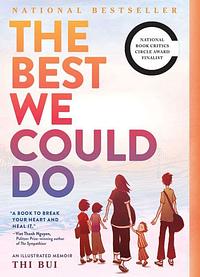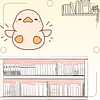You need to sign in or sign up before continuing.
Take a photo of a barcode or cover
challenging
emotional
inspiring
medium-paced
emotional
inspiring
reflective
sad
tense
medium-paced
The illustrations are absolutely amazing and incredibly well done, especially in context with the different text. And paired with the heartbreaking story, this memoir is one that I will remember as it brought so many insightful ideas and perspectives.
Engrossing story and my first graphic novel on a Kindle. I was surprised at how well it worked.
dark
emotional
informative
reflective
sad
tense
fast-paced
Really enjoyed the later half of this book, helped better imagine what my parents might have went through when they fled Vietnam.
dark
emotional
reflective
sad
tense
medium-paced
This is, without a doubt, one of the top 3 best Asian memoirs I have ever read. Even Thi Bui's opening introduction was such a beautiful love letter to her family and their story; with her noting how this memoir contains so much oral history, which was then transcribed into essays before she realized that this story demanded to be told in a graphic novel medium, which led her to actively learning art in order to tell her and her family's story, I was already tearing up from the first page.
The biggest element I find to lacking in memoirs written from Asian diaspora authors from the Asiatic Global North (Japan, Korea, and China), is how these authors write with such self aggrandizing tones, speaking to a level of entitlement where they feel their lack of knowledge on their culture is the sole fault of their parents. And the lack of this attitude from Asian diaspora authors from the Asiatic Global South is the main reason I feel so drawn to their stories, and "The Best We Could Do" was no exception.
With sharp and unflinching clarity, Bui details the events of her upbringing, beautifully interwoven with her parent's upbringing. As readers watch Bui begin her complicated journey into motherhood, the pages begin to be filled with introspections about her complex relationship with her own mother and grappling with the concept of being both a mother to her son and a child to her own mother. Her writing has a seamless and natural flow, progressing from story to story in a non-linear fashion that somehow also ties her reflections together.
The manner with which she explores Việt Nam's history with colonization and war never shies away from the darker outcomes of war, so I do encourage readers to read content warnings prior to reading this book. But the level of nuanced reflection of her family's intergenerational trauma tied into Bui's telling of her parent's and her own life in Việt Nam spoke to a level of internal reflection and analysis that felt like it fully shaped her into the person she is today, which was by far my favorite aspect of this memoir. There are moments when Bui admits that her parents did not make the best parenting choices for their children. But these moments siphon directly into reflections on how both her parents were heavily traumatized by multiple wars within Việt Nam with forces outside of their control constantly making their choices for them. And finally, Bui comes to terms with how she does not fault her parents for the choices they made, acknowledging that her parents raised their children to the best of their ability.
This memoir moved me to tears on multiple occasions—Thi Bui's writing paints a vivid picture (quite literally!) of her family with all their flaws and imperfections, and yet with so much love for how they helped mold her own being and so much grace in the midst of the atrocities her parents have faced. Her art style feels immensely purposeful, especially with her use of reds within its pages. It's hard to fully put into words how deeply meaningful this memoir is, so I will simply end with giving this book my highest recommendation. "The Best We Could Do" is a story that truly deserves all of the accolades it has received.
The biggest element I find to lacking in memoirs written from Asian diaspora authors from the Asiatic Global North (Japan, Korea, and China), is how these authors write with such self aggrandizing tones, speaking to a level of entitlement where they feel their lack of knowledge on their culture is the sole fault of their parents. And the lack of this attitude from Asian diaspora authors from the Asiatic Global South is the main reason I feel so drawn to their stories, and "The Best We Could Do" was no exception.
With sharp and unflinching clarity, Bui details the events of her upbringing, beautifully interwoven with her parent's upbringing. As readers watch Bui begin her complicated journey into motherhood, the pages begin to be filled with introspections about her complex relationship with her own mother and grappling with the concept of being both a mother to her son and a child to her own mother. Her writing has a seamless and natural flow, progressing from story to story in a non-linear fashion that somehow also ties her reflections together.
The manner with which she explores Việt Nam's history with colonization and war never shies away from the darker outcomes of war, so I do encourage readers to read content warnings prior to reading this book. But the level of nuanced reflection of her family's intergenerational trauma tied into Bui's telling of her parent's and her own life in Việt Nam spoke to a level of internal reflection and analysis that felt like it fully shaped her into the person she is today, which was by far my favorite aspect of this memoir. There are moments when Bui admits that her parents did not make the best parenting choices for their children. But these moments siphon directly into reflections on how both her parents were heavily traumatized by multiple wars within Việt Nam with forces outside of their control constantly making their choices for them. And finally, Bui comes to terms with how she does not fault her parents for the choices they made, acknowledging that her parents raised their children to the best of their ability.
This memoir moved me to tears on multiple occasions—Thi Bui's writing paints a vivid picture (quite literally!) of her family with all their flaws and imperfections, and yet with so much love for how they helped mold her own being and so much grace in the midst of the atrocities her parents have faced. Her art style feels immensely purposeful, especially with her use of reds within its pages. It's hard to fully put into words how deeply meaningful this memoir is, so I will simply end with giving this book my highest recommendation. "The Best We Could Do" is a story that truly deserves all of the accolades it has received.
A very serious and realistic portrayal of life that will pull at your heart strings and make you ache in ways you never knew were plausible. This is a spectacular story, and it deserves to be stated.
This was a really fascinating graphic memoir! I learned a lot about the Vietnam War and how many families struggled to get to a place of safety and peace. For me, the middle chunk of the book was boring and the structure of how Bui told the events was a tiny bit confusing for me. But, the end was action-packed and sooo good. Go pick it up if you want info about a family’s journey to find comfort in the midst of the Vietnam War.
emotional
informative
reflective
fast-paced
adventurous
challenging
dark
emotional
hopeful
informative
inspiring
reflective
sad
tense
medium-paced





